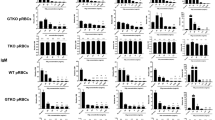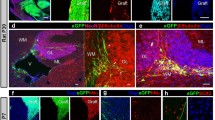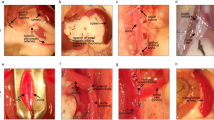Abstract
IT is generally agreed that the internal environment in new-born animals is not favourable for antibody formation to occur, as has been postulated by Dixon1,2. It has, however, been demonstrated in our laboratory3–5 that new-born animals are more suitable recipients for transferred cells producing antibodies—during the period when they are not capable of their own active antibody synthesis6—than X-irradiated adult animals. We suppose that the homotransplantation reaction is the main factor limiting antibody formation by cells transferred to young animals7. Simonsen8 has shown that spleen cells of adult hens are tolerated if transferred to chicken embryos three days before hatching. We assumed, therefore, that by using the chicken embryo as recipient it will be possible to obtain fully developed formation of antibodies to bacterial antigens and also a positive primary response to a protein antigen. According to Dixon's assumption, this should, on the other hand, lead to a further decrease in the intensity of antibody formation in embryos.
This is a preview of subscription content, access via your institution
Access options
Subscribe to this journal
Receive 51 print issues and online access
$199.00 per year
only $3.90 per issue
Buy this article
- Purchase on Springer Link
- Instant access to full article PDF
Prices may be subject to local taxes which are calculated during checkout
Similar content being viewed by others
References
Dixon, J. F., and Weigle, O. W., J. Exp. Med., 105, 75 (1957); Fed. Proc., 16, 411 (1957).
Waksman, H., and Matoltsy, M., J. Immunol., 81, 235 (1958).
Šterzl, J., Immunological Conference of Czechoslovak Academy of Science (Nov. 29–Dec. 1, 1954); Fol. Biol., 1, 193 (1955).
Trnka, Z., Nature, 181, 55 (1958).
Holub, M., Nature, 181, 122 (1958).
Šterzl, J., and Trnka, Z., Nature, 179, 918 (1957).
Šterzl, J., Czechoslovak. Microbiol., 3, 61 (1958); Transpl. Bull., 5, 73 (1958).
Simonsen, M., Acta Path. Microbiol. Scand., 40, 480 (1957).
Author information
Authors and Affiliations
Rights and permissions
About this article
Cite this article
TRNKA, Z., ŘÍHA, I. Antibody Formation by Isolated Spleen Cells transferred to Recipients in Absence of Homotransplantation Reaction. Nature 183, 546–547 (1959). https://doi.org/10.1038/183546a0
Issue Date:
DOI: https://doi.org/10.1038/183546a0
This article is cited by
-
Organ growth regulation in embryogenesis communication IV. The influence on the growth of chick embryo organs of a substance from splenic cells which passes through membranous filters
Bulletin of Experimental Biology and Medicine (1964)
-
Transfer to Neonatal Chickens of the Primary Antibody Response initiated in vitro
Nature (1963)
-
Antibody formation by cells isolated from donors of different ages after transfer to young rabbits and to X-irradiated adult rabbits
Folia Microbiologica (1963)
-
Mechanism of Recovery from Viral Infection in the Chick Embryo
Nature (1961)
-
Morphology of antibody production by different cell systems in diffusion chambers
Folia Microbiologica (1960)
Comments
By submitting a comment you agree to abide by our Terms and Community Guidelines. If you find something abusive or that does not comply with our terms or guidelines please flag it as inappropriate.



